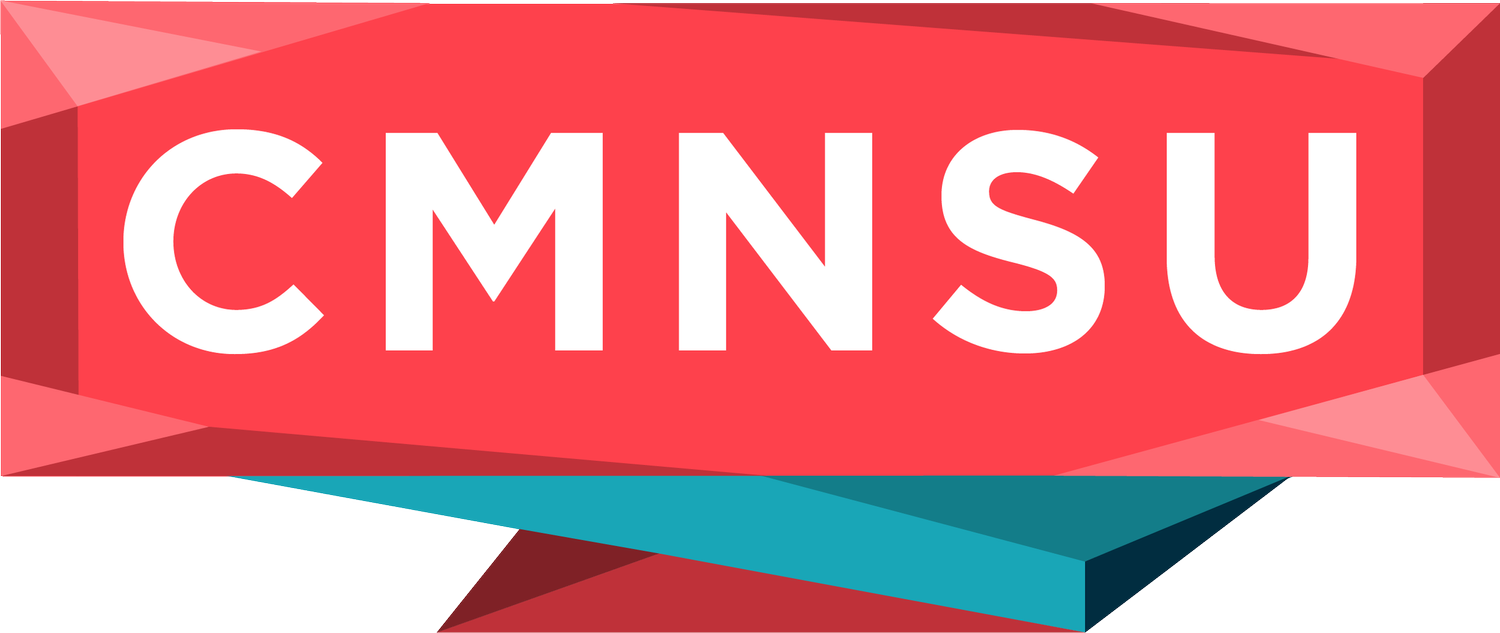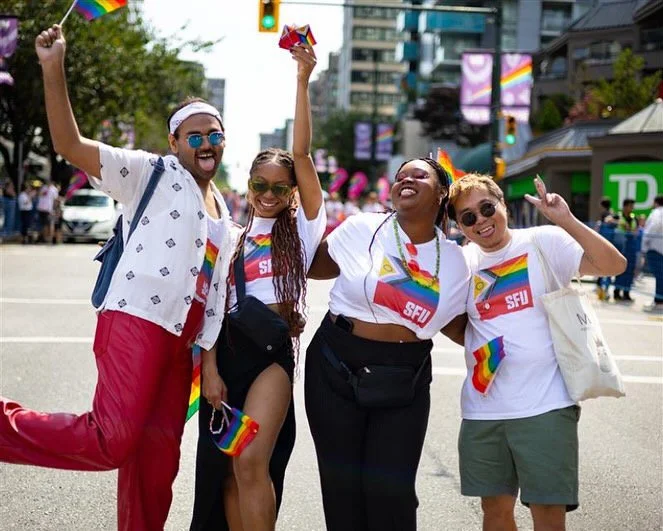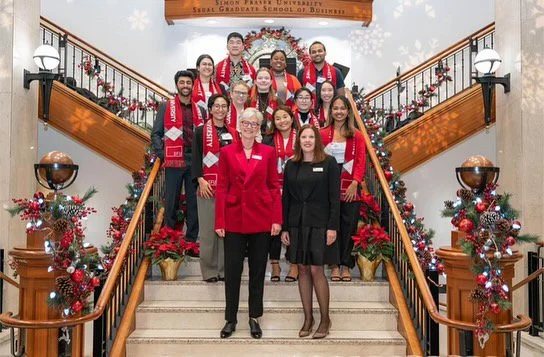Career Conversations - SFU Advancement and Alumni Engagement
Career Conversations - “Simon Fraser University - Navigating the world of higher ed fundraising” with Talha Butt
Navigating the search for your first full-time job that matches your major & interests can be an overwhelming journey. Whether you are a freshman, transfer student or a soon-to-be-alum, we all go through a stage during our undergraduate years where we aimlessly stare at the laptop screens, not knowing where to start. Not to mention that one resume.docx that’s been piled up on top of million tabs, waiting to be revisited when the pressure to get a job finally kicks in. It’s a dreadful experience, and we all deserve someone to ask questions, seek help from, and get support—so let’s talk about it.
Career Conversations, a blog series newly launched by CMNSU, aims to provide co-op/job experience of Communication students and alumni in diverse sectors. Through conversation-based interviews, we aim to capture insights and tips that will help you to get your foot in the door in the various professional fields.
“Always remember the bigger purpose of your job, that will allow you to enjoy what you do.” - Talha Butt is a fifth-year student majoring in Communication. With a passion for community involvement and a commitment to supporting students’ educational experiences, Talha shares his journey in the Gift and Estate Planning sector of SFU Advancement and Alumni Engagement.
1. Can you tell us about your first Full-time position experience?
I am currently working full-time at SFU, and have been in this role for about two years. I work in a department called SFU Advancement and Alumni Engagement, specifically in the Gift and Estate Planning sector. There are various ways of fundraising, and we focus specifically on working with donors who wish to leave a gift in their will to SFU. The support takes different forms, all of which go towards enhancing the students’ educational experience at SFU in forms of bursaries, scholarships, research funding, and more.
My journey in this sector actually started as a student fundraiser back in 2019, making this my fifth year being involved in the sector. As a student fundraiser, my task involved contacting SFU alumni to help fundraise for scholarships and bursaries. Communicating in a remote setting can sometimes be challenging, but it was also very fulfilling to know that I was contributing to improving students’ educational environment. Within the first eight months of working as a student fundraiser, I was promoted to a team lead within the same department during pandemic. Through that experience, I became more and more invested in the world of fundraising, which eventually led to my current role in gift and estate planning.
How did you initially find the student fundraiser job—the opportunity that led you to where you are now? - I found my first opportunity as a student fundraiser on the Myinvolvement SFU portal. Within this opportunity, I later became a team lead within the same department, and this journey eventually led to where I am now.
2. Some of the major accomplishments you’d like to share from your full-time experiences?
As someone who has received awards and scholarships within the Communication department, I feel that being involved in the fundraising sector at SFU is my way of giving back to the community that has given so much to me. It is truly a fulfilling job. Regarding accomplishments, I have raised over thousands of dollars for school scholarships, bursaries and mental health resources for students at SFU: as a student fundraiser.
Additionally, during my time as a team lead at the call centre, we faced a challenge due to the COVID-19 lockdown, leaving us with only two options—to either close down the call centre and let go of the student fundraisers, or figure out a way to continue operating in a remote setting. After meeting industry-specific requirements, we became the first higher education call center in North America to have a functioning call center during the pandemic, ensuring that the support system for student education remained present even during tough times.
Lastly, as part of the alumni program, we publish a magazine every summer and winter. During my time in this position, I’ve had the opportunity to profile three amazing SFU alumni and interview them to put together inspiring stories. This ties back to my major in Communication. With the sponsorship experience I gained as a VP of Communications at CMNSU, I am now part of the team reaching out to sponsors for the Gibson Art Museum opening day. This is a very fulfilling experience, as it reminds me of where I have started—as a CMNSU member—and how I’m now applying what I learned into action in my workplace. It's a very rewarding and exciting experience to have.
3. Were there any challenges or unexpected aspects of the job that you have experienced?
One challenge I had to overcome was building workplace relationships during the pandemic when everything was online. As I was more introverted back then, it felt challenging to have small talk with colleagues or initiate conversations. However, I soon realized that work isn’t just about doing your job, but it is also about building and maintaining good professional relationships, whether with coworkers or stakeholders. I learned that this was something that I needed to adjust to, knowing how to be friendly and be professional at the same time.
Additionally, when I started my full-time position, I was also a full-time student, taking roles as a VP of Communications at CMNSU and a director at TEDxSFU. This experience taught the importance of work-life balance, especially when handling multiple responsibilities. Maintaining a social life is equally important to me for recharging and supporting my professional development. With this, finding and maintaining that work-life balance became essential, ensuring that I prioritize all aspects of my life, whether it’s work, school or volunteering.
4. What tactics did you use to overcome such challenges?
I come from a theatre background, so practicing and talking in front of a mirror really helped me to get comfortable with speaking. I still use this technique in all aspects of my life. For instance, if I have an upcoming interview, I would do my entire interview preparation in front of a mirror. It’s also a good way to see how I communicate in a non-verbal way, which is another important aspect to consider during an interview. Additionally, I made a conscious effort to step out of my comfort zone by initiating conversations with colleagues. This helped me break the ice and become more at ease with talking and interacting with others.
Regarding work-life balance, having an open communication with your supervisor is crucial. If you need a break or a time off, it is important to have clear communication with your supervisor and ask for support. Without prior communication, your supervisor might expect the work to be completed on time without any concerns, which can be challenging.
5. Any insights/key takeaways you learned through your first full-time experiences?
I believe learning how to interact and communicate with people was a big factor I learned, in addition to the importance of understanding that rejection is normal, and it’s crucial not to take things personally. The saying “leave your work at work” really demonstrates this, as if one doesn’t, it’s going to follow you in all aspects of your life.
When I am doing a job, I always try to encourage myself to look at the bigger picture and the purpose behind what I’m doing. The bigger purpose for me is to give back to the SFU community and ensure that as many students as possible are able to afford a university education. This purpose is what motivates me to be in the field of fundraising and enjoy what I do. That’s why I always tell people that if you are going to do a corporate job, keep the bigger picture in mind and remind yourself of it. It will prevent you from getting burned out and allow you to find fulfillment in what you do.
6. How did your first student fundraiser position contribute to your skill development & current career paths?
My perspective on the potential career paths I want to pursue over the course of the last couple of years have definitely expanded through experience in the world of fundraising. Additionally, it has shown me how versatile a Communication degree can be. For any Communication students who are worrying about not having a specific career path figured out to them, I would say, “the world is your oyster”, because a Communication degree can be applied to any position, field, genre of work you wish to pursue. That is the beauty of it—it’s applicable to basically anything you want to pursue and are passionate about.
I understand such versatility can be a double-edged sword, and that is why a work experience like co-op can be handy. Such work experience will help you narrow things down on what you want to do within the Communication field. Becoming a part of student clubs and student societies will also help you find your passion in different fields too, so I definitely recommend students to join them.
7. What was your full-time job hunting experience like, and what strategy did you find most helpful?
My first full-time position was as a student fundraiser, which eventually led to a promotion to team lead. During that time, I was also working at Fraser International College with their student engagement and retention, as well as marketing. These experiences collectively led me to where I am today. Networking also definitely helped me, as I connected with people who previously had my job, and asked them for a coffee chat. I also reached out to my current supervisor to ask more about the role and the department, so I feel that networking definitely had a huge role to play in securing the full time position that I currently have. I also have a few friends who were able to land in a full time position through networking, so having a good network and building relationships is definitely important.
Additionally, I would advise anyone job hunting to fully invest in whatever field you are trying to get into—whether that means watching TED Talks, attending webinars, LinkedIn networking, community involvement or more. Regardless of the industry/sector you are interested in, make it a part of your lifestyle for a while. When you do this, your knowledge and passion will come more naturally in interviews, as you’ve already gotten yourself immense and involved in the field. That’s the best advice I can offer.
8. Do you have any advice for a strong job application package / interviews?
One key piece of advice is to practice in front of a mirror. You can pick up so many different things that you might not be aware of, and it will help you to see how you present yourself to others.
Additionally, ask for feedback from various sources for your package. I usually call it the 3F: your Friends, Family, and Faculty. Have at least one person from each of these categories to review your package, and it will truly help you a lot. I always use this method when I update my resume or my entire job application package, and it truly makes a difference. Also, ensure your references are checked as well. People sometimes undermine the importance of good references, but I know a few who’ve almost got on the job, and then when it came to their references, they lost it during that stage.
Finally, be ready to share what you do outside of your work. Especially with Communication-related roles, recruiters often appreciate hearing about your activities beyond academic work. Have something ready to share about your interests and hobbies.
9. What activities/involvement outside academic aspects do you feel were helpful in securing your current / previous work positions?
Since I started at SFU, I knew that I wanted to get involved within the SFU community beyond academics. I treated “Myinvolvement” like my best friend for the first couple years of my degree, and checked it weekly, if not daily for any volunteer opportunities to use it for building my resume. As an international student from a cultural background where you don’t work until you are a full adult in your 20s, I felt that it is especially necessary to be involved in diverse experiences to strengthen my resume.
With this in mind, I worked with The Peak Publication Society as the Social Media and Events manager for 2-3 years. I also engaged with SFU Recreation, SFU Student Engagement and Retention, TEDx, and of course, CMNSU. Additionally, I started a program called Queers and Allies, which supported international queer students by creating a virtual community and organizing gatherings to go to drag shows and explore queer culture in Canada. This initiative, which received support from FIC and SFU, ran for around a year and attracted around 30 students for bi-weekly events, making a meaningful impact.
Going back to the job aspect, it’s these experiences that are important for you when looking for a job. Whether you identify as a queer, an immigrant, or have any other personal experiences, supporting your community can be beneficial. It’s these unique experiences and genuine involvement that can make a significant difference and can really go a long way.
10. What advice would you give to undergraduate students, primarily to those who are starting their university years?
I often hear people talking about not having opportunities, but to an extent, it comes down to “looking hard enough”. When you start university, the opportunities are there—all you have to do is go out and grab them, and just make the most out of those opportunities. So once again, make sure that you’re actively looking at what the university, your program, and the faculty has to offer, and that you are volunteering and getting involved. I can’t emphasize enough how much getting involved with the community enhances your university experience. It truly makes your time as a student much more rewarding.
11. Do you have any advice to those who are soon-to-be-alumni?
For first year students, you would usually tell them to not overwork themselves, and treat it “like the honeymoon phase of the marriage”; as once you enter the workforce, you’re not going to have a random Wednesday or Tuesday off. So to the undergraduate students who are just starting their journey, I would say that you should prioritize your mental health while you’re in school to avoid feeling overworked and exhausted when you start working.
But to those who are like in our boats, who are soon to be alumni, you’ve done everything that you can do. This is your time to start enjoying the possibilities of what’s to come. Now is the time to start solidifying and securing your references from your professors and your TAs. Even if you don’t have anything lined up, I usually like to get a letter of reference, even just a generic one, as it would only benefit you in the long run; you would never know when you are going to need it. Once you are out of school, and if you’re not coming back to school, it is also kind of hard to keep in touch with your professors and TAs. But as you are nearing the end of your degree, I would say this is the perfect time to do so. It is also important to start looking for a job if you haven’t already, as soon as you are done with finals!
Lastly, don’t see this as an end to your journey, but more like a continuation to your undergraduate journey—because everything that you’ve learned now, all the ups and downs that you’ve experienced is now going to be put to test. Personally, I find that very exciting, so I hope everyone else who’s reading this, is also excited about their journey as well!




